
Overcoming Procrastination: What Really Motivates Us To Get Things Done And The Surprising Truth of What Makes Us Happy
955232 views

Procrastination: We’ve all been there. If you’re reading this, it’s probably because you’ve been procrastinating on the task at hand.
Why do you procrastinate? Probably because you want to do something more interesting, fun, or something that delights you. But by doing so you are already losing your chances of success.
If you’re anything like me, you’ve probably had those moments when you promised yourself, “I will definitely not procrastinate this time.” And then, you find yourself watching YouTube videos half an hour before your deadline. Why does this happen?
There are many reasons behind procrastinating: fear of failure, fear of success, perfectionism, stress, and low self-confidence. When we are afraid or stressed out (or both), our brains can actually go into panic mode and freeze up.
But why do we procrastinate so much? According to experts, there are two major reasons: firstly, we are biologically hardwired to seek out pleasure. Secondly, our brains are just really bad at planning for long-term rewards.
One study found that a key reason people procrastinate is that they’re more focused on avoiding pain than seeking pleasure—just like how children might choose to eat ice cream over doing their math homework.
Researches suggest that there is a link between procrastination and our happiness levels. Apparently, if you avoid the task at hand and focus on other things that help you relax, your happiness will increase but only temporarily.
Basically, our brains have evolved to enjoy doing things that make us feel good at the moment (watching TV, eating delicious food, or spending hours on the phone with your friend), and don’t like doing boring things (like chores or homework).
And even when we know that doing those boring tasks will pay off in the long run (like getting a promotion at work), we’re still not very good at planning for those rewards because they’re so far away.
Our brains are hardwired to seek out rewards in the near term and avoid discomfort in the present moment. So when we feel overwhelmed by a big task, our brain translates that into “discomfort,” and thus seeks to avoid it.
Procrastination also makes you think that there will be ample time in the future to do the task. But this way of thinking is totally wrong. You need to understand that if you don’t do your task now then it will keep getting delayed and delayed until it reaches a point where it can’t be recovered.
What can you do to overcome the vicious cycle of procrastination?
Well, we actually have some answers for you. Let’s talk about how you can find your reasons behind procrastination and what you can do to overcome it.
In our ongoing search for answers to those questions, we’ve been studying this whole procrastination thing for a while now. Here’s what we found out:
We don’t really want to do the thing that’s making us procrastinate. This sounds obvious, but really think about it: if you wanted to do something, would you put it off? Nope! You’d just sit down and start working on it right away.
So the next time you’re feeling that urge to do anything but work on the thing you actually need to work on, try asking yourself why you don’t want to do that thing—and then figure out if there’s a way you can make yourself WANT to do it (or at least not mind as much).
Here’s a psychological trick everybody should know:
When you actually do get started on a task, your brain will experience a burst of dopamine—the same chemical that’s released when you like a photo on Instagram or take the first sip of a really good cup of coffee—as a reward for completing the task. So you can use this knowledge to trick your brain into doing what you want!
Setting small goals for yourself throughout the day has proven to be effective. So instead of planning to read a whole book by the end of the week, break up that goal into smaller chunks (for example, reading 20 pages per day).
Try starting small, start with one tiny step toward accomplishing your goal, and let your brain experience that dopamine rush. That will motivate you to keep going!
Then, focus on what really matters – is this task going to make an impact on your life in the long run? If yes, then just get started on it because once you get into the flow of the action, your feelings and emotions will simply play along.
You can overcome procrastination with the right mindset and discipline. Here are some actions you can take:
- Identify and write down the tasks you tend to procrastinate on. Take a time to think about what they have in common – is it fear of failure, fear of responsibilities, perfectionism, or simply you want to be doing something else deep down?
- Separate actionable tasks from non-actionable ones to be as realistic as possible. This way you’ll avoid punishing yourself because of unrealistic expectations and you will create confidence that you are actually capable of completing the task.
- Take time management seriously – sometimes you need to just make yourself do things despite what you feel. Look at yourself as if you are a mentor, teaching your student to be more disciplined and responsible.
- Write down your goals and plan for them (use a calendar). Imagine what kind of person you will become and what you feel after you accomplish your goals. This will help you stay motivated all the time and manage your depression-happiness levels.
Are you ready for taking things more seriously?

Procrastination is directly linked with depression and stress levels. While sometimes it’s a good idea to go to a therapist and talk about your issues, there are several aspects that you can control by yourself.
You just need a specific plan tailored to your current situation and objectives that will help you understand your issues deeper and know what are the concrete steps necessary to break the vicious cycle of procrastination.
There’s a simple program called Virtue Map that starts with a quiz to determine your procrastination type and level.
Then, the program sends you an anti-procrastination plan that’s made for you according to your answers.
It’s a simple method if you think about it, but our research shows significant progress in people who choose to use the Virtue Map plan to overcome their procrastination.
And to think about it, it all starts with a simple quiz.
Try it out for yourself and get the answer to the most important questions: What’s the real reason behind your procrastination? What can you do to take back control and achieve more in life? What’s the thing you truly desire and how you can use that dream to motivate yourself out of procrastination, anytime?
Take a quiz and find out by yourself.
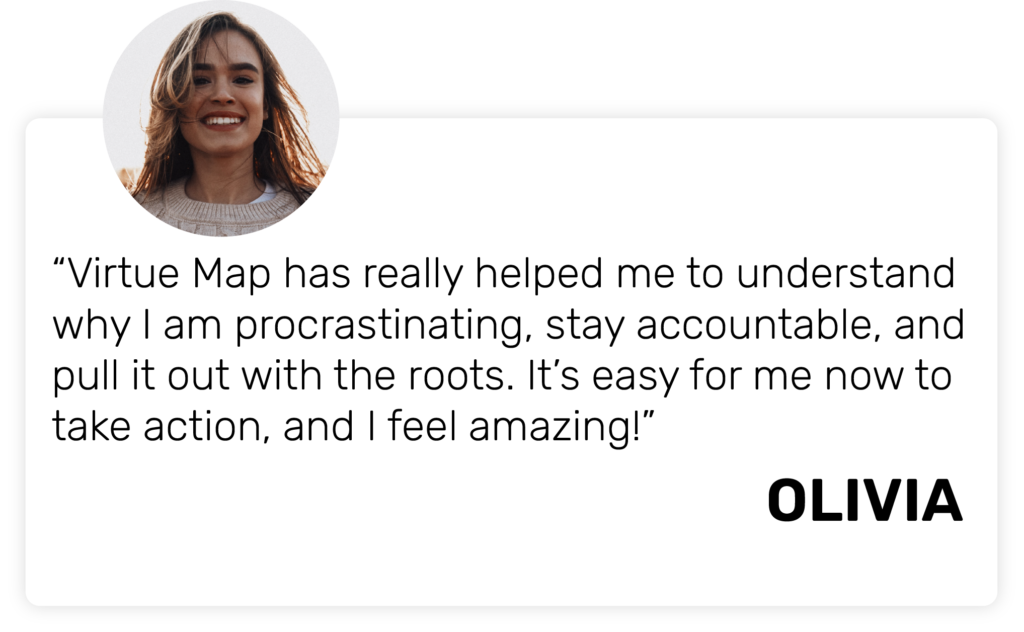
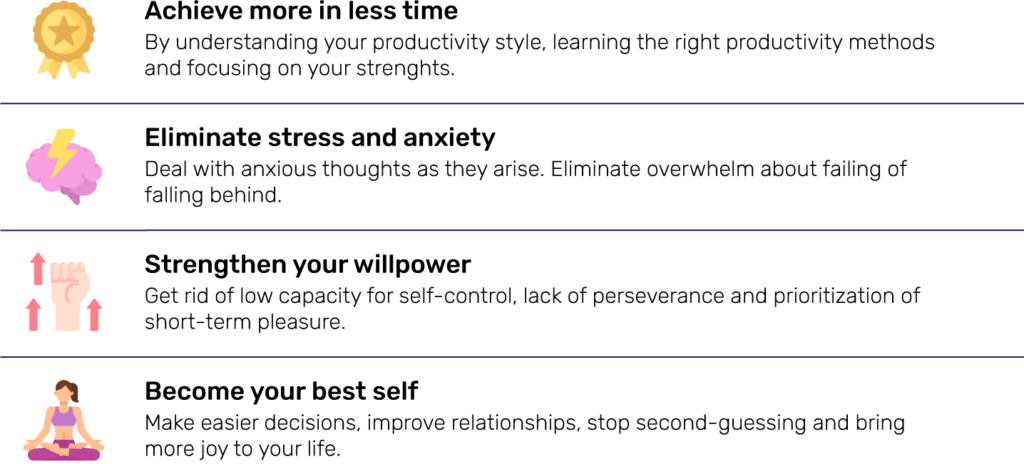
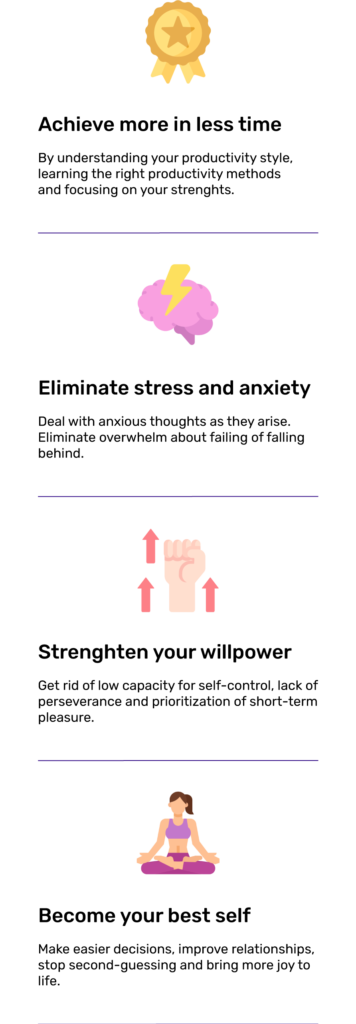
Loved by thousands.
The most popular personalized productivity and motivation tool. Over 154,200 plans ordered!

4.7/5

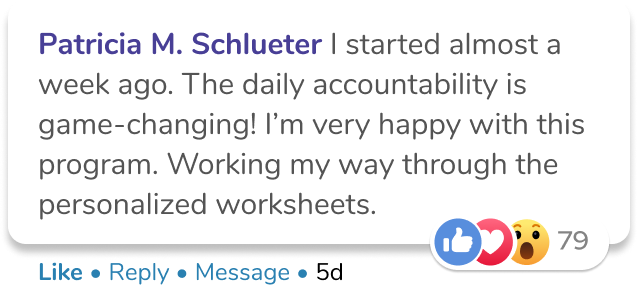
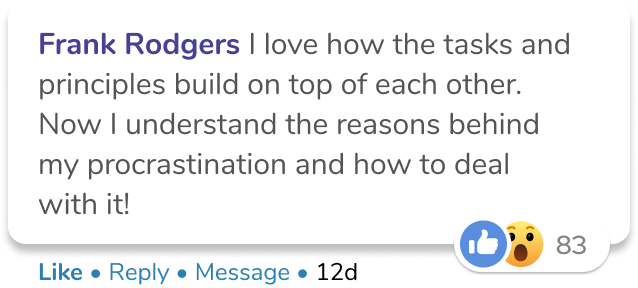

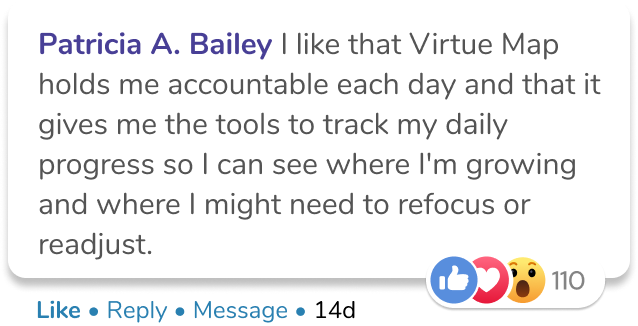
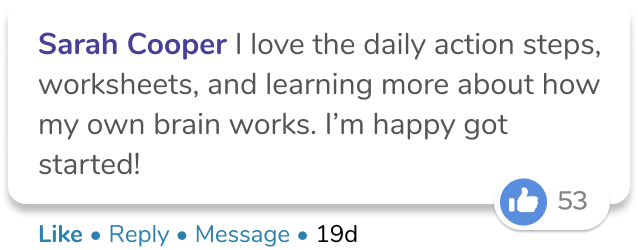
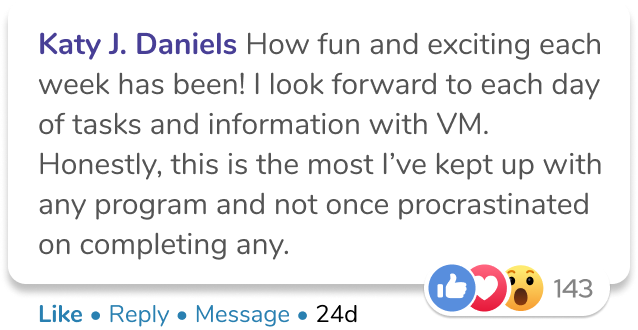
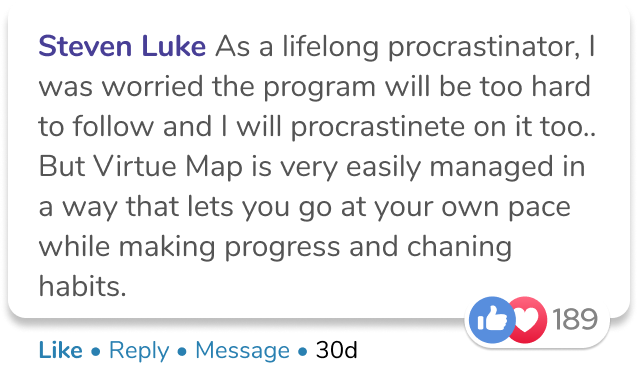

Copyright © 2022 Virtue Map. All rights reserved.
Virtue Map does not provide medical advice, diagnosis or treatment.
